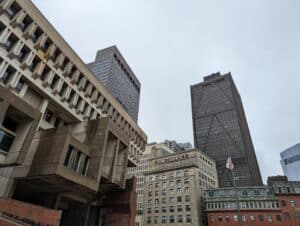Biz Leaders: Wu’s Tax Plan Makes Suburbs Winners


Boston City Hall and downtown Boston office buildings seen from City Hall Plaza. Photo by James Sanna | Banker & Tradesman Staff / file
Business leaders warned Wednesday morning that increases to Boston’s commercial property tax rate would further diminish downtown as an economic center and drive businesses to Cambridge and suburban communities.
The Boston Municipal Research Bureau, an independent fiscal agency, recommends tapping into Boston’s $1.1 billion rainy day surplus fund to cover an anticipated $500-million-a-year drop in tax collections related to declining commercial property values.
“We think there’s multiple things that can be combined to address the problem without having to shift all of these taxes on the commercial sector,” said Marty Walz, acting director of the bureau. “One can argue that it’s raining, and this is a time to use some of those reserves until we figure out longer-term solutions.”
Walz’ comments took place at a forum sponsored by commercial real estate group NAIOP Massachusetts, as the Boston City Council plans another hearing May 30 on Mayor Michelle Wu’s proposal.
Subject to council and state legislative approval, Boston’s split tax rate would be shifted further onto commercial properties for five years beginning in fiscal 2025.
In introducing the legislation, Wu predicted that many commercial properties’ tax bills will drop because of lower assessments related to declines in occupancy, but not as fast as they would under the current rate.
The administration has argued temporarily shifting more of the city’s tax burden onto commercial payers was necessary to prevent city residents from facing sudden and potentially difficult increases in their own bills, whether via property taxes on a home they own or increases in rent as multifamily landlords passed on their own tax increases to tenants. Multifamily assets in Massachusetts are generally taxed as residential, not commercial properties.
Former Mayor Tom Menino took a similar tack in 2004 following the collapse of the dotcom bubble.
Report: Plan Would Further Sink CRE Values
In a report submitted this week to the Boston City Council, tax consultants Ryan predicted that the commercial tax rate will jump by 17 percent in fiscal 2025 if the Wu proposal is adopted. Higher taxes in turn are likely to further deter leasing activity, since tenants typically pay real estate taxes under a triple-net lease.
The report estimated a $2.6 billion drop in commercial property values, related to higher expenses and the effects that deter tenants from locating in the city, Ryan Principal Dan Swift said.
Declining commercial property values in the face of shrinking office occupancy alone could lead to a $500 million decline in Boston’s property taxes by 2029, the Boston Policy Institute projects.
But spending cuts and new incentives for residential conversions should be considered before adding to the financial burdens of commercial properties undergoing a structural downturn in post-pandemic usage, panelists said.
Consultants Ryan drew up two scenarios for fiscal 2025, comparing the current tax structure with Wu’s proposal. Under the existing system, commercial tax rates would rise 2.7 percent to $25.95 while the residential tax rate would increase 10.2 percent to $12.02.
Under Wu’s proposal, commercial tax rates would spike 17.4 percent to $29.66, while the residential tax rate would decline 7.8 percent to $10.05.
Fears Boston Would Lose to Suburbs
A higher tax rate will diminish Boston’s ability to compete against Cambridge and the suburbs for business attraction and retention, Swift predicted. Boston’s commercial tax rate of $25.27 per $1,000 of assessed value is more than twice that of Cambridge’s $10.46.
Despite the partial return-to-office policies of many employees, downtown commercial real estate is permanently transformed in ways that will require landlords’ investment to attract office and retail tenants, Eastern Bank Chief Credit Officer Matthew Osborne said.
Office rents have declined 10 percent from their peak in 2022, according to a recent CBRE report.
Even Class A office buildings, which have retained higher occupancy rates than lower-tier buildings, are being forced to offer concessions to stimulate leasing activity, Osborne said.
“Class A is unquestionably performing better from an occupancy standpoint, but occupancy does not pay the bills. They are very expensive to operate… but they are fighting for a smaller and smaller pool of tenants and we see them giving away larger incentives,” he said.
Greater Boston’s traffic congestion, ranked the world’s fourth-worst in a 2023 analysis, and the MBTA’s service delays and disruptions are the biggest hurdle to higher office occupancy, Greater Boston Chamber of Commerce CEO James Rooney said.
“Given the labor market, employers don’t want to push the issue right now,” he said.
Boston’s tax incentives program for office-to-residential conversions has had limited success, Osborne noted, with developers submitting applications to create 216 units at six properties.
“There needs to be more incentives that encourage these conversions, because we have a one-time generational opportunity to meet the housing demands we have,” he said.
Biz Leaders: Wu’s Tax Plan Makes Suburbs Winners #Biz #Leaders #Wus #Tax #Plan #Suburbs #Winners
Source Link: https://bankerandtradesman.com/biz-leaders-gather-to-pan-wus-property-tax-plan/
Boston City Hall and downtown Boston office buildings seen from City Hall Plaza. Photo …
Biz Leaders: Wu’s Tax Plan Makes Suburbs Winners – #Global – BLOGGER – Global, Biz, leaders, Plan, Suburbs, Tax, Winners, Wus
Biz Leaders: Wu’s Tax Plan Makes Suburbs Winners Boston City Hall and downtown Boston office buildings seen…
https://www.merchant-business.com/biz-leaders-wus-tax-plan-makes-suburbs-winners/?feed_id=24977&_unique_id=6665404988f90